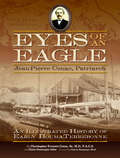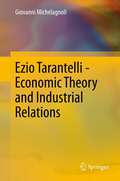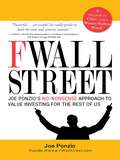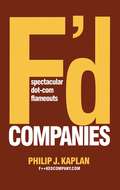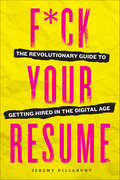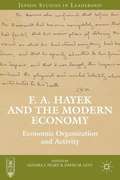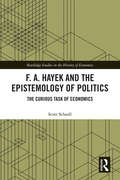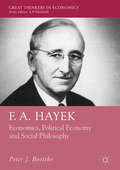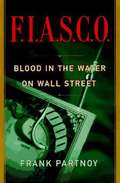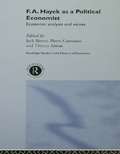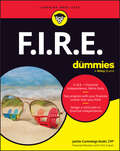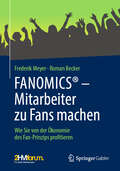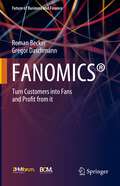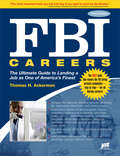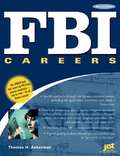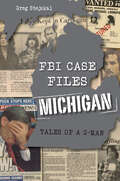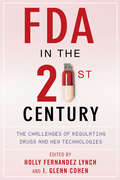- Table View
- List View
Eyes of an Eagle: Jean-Pierre Cenac, Patriarch: An Illustrated History of Early Houma-Terrebonne
by Christopher Everette Cenac Sr.Selected Book for the Louisiana Bicentennial Celebration, 2012In the year 1860, Jean-Pierre Cenac sailed from the sophisticated French city of Bordeaux to begin his new life in the city with the second busiest port of debarkation in the U.S. Two years before, he had descended the Pyrenees to Bordeaux from his home village of Barbazan-Debat, a terrain in direct contrast to the flatlands of Louisiana. He arrived in 1860, just when the U.S. Civil War began with the secession of the Southern states, and in New Orleans, just where there would be placed a prime military target as the war developed.Neither Creole nor Acadian, Pierre took his chances in the rural parish of Terrebonne on the coast of the Gulf of Mexico. Pierre's resolute nature, unflagging work ethic, steadfast determination, and farsighted vision earned him a place of respect he could never have imagined when he left his native country. How he forged his place in this new landscape echoes the life journeys of countless immigrants--yet remains uniquely his own. His story and his family's story exemplify the experiences of many nineteenth century immigrants to Louisiana and the experiences of their twentieth century descendants.
Eyes of the Heart: Seeking a Path for the Poor in the Age of Globalization
by Jean-Bertrand AristideIn this startling and passionate book, Aristide demonstrates why those on the bottom will never lie down. A graphic revelation of what happens when "free" trade overruns local markets, eradicates local economies, and creates dependence on foreign charity.
Ezio Tarantelli - Economic Theory and Industrial Relations
by Giovanni MichelagnoliThe present book analyses the work of Ezio Tarantelli, a remarkable Italian scientist and economist killed by the Red Brigades in 1985 after only a short life (1941-1985). Tarantelli's work and its implications are not only of importance for Italian researchers, but also represents a contribution of interest to economists worldwide. The first chapter of this volume shows the most important features of the European and Italian economy from 1970 to 1985. The contribution of Tarantelli, in fact, was his attempt to address the questions arising from such a context, incorporating the thought of F. Modigliani and J. Robinson in the process. After some brief biographical notes in the second chapter, the third and the fourth concentrate on Tarantelli's theoretical contribution. The fifth chapter and the conclusions, finally, show how, from his economic analysis, he derived some economic policy proposals that still hold relevance today. The text includes a complete bibliography of his scientific writings.
F Wall Street: Joe Ponzio's No-Nonsense Approach to Value Investing For the Rest of Us
by Joe PonzioInvestors shouldn't hate the market because of its up and downs. They should capitalize on it—and give a middle finger to those brokers wasting their time (and money) buying and selling, viewing investing as just buying stocks and not taking ownership of a company. In this book, Joe Ponzio gives an "f-you" to Wall Street and teaches you how to become a sharp value investor who uses economic downturns to your advantage. By buying into companies you believe in--but that may be selling for less than their intrinsic value, like high-end retailers in a weak market and discount retailers in a strong one--you will profit from their long-term performance. It's the perfect guide for anyone fed up with Wall Street's bull.
F Wall Street: Joe Ponzio's No-Nonsense Approach to Value Investing For the Rest of Us
by Joel PonzioInvestors shouldn't hate the market because of its up and downs. They should capitalize on it-and give a middle finger to those brokers wasting their time (and money) buying and selling, viewing investing as just buying stocks and not taking ownership of a company.In this book, Joe Ponzio gives an "f-you" to Wall Street and teaches you how to become a sharp value investor who uses economic downturns to your advantage. By buying into companies you believe in-but that may be selling for less than their intrinsic value, like high-end retailers in a weak market and discount retailers in a strong one-you will profit from their long-term performance. It's the perfect guide for anyone fed up with Wall Street's bull.
F'D Companies: Spectacular Dot-com Flameouts
by Philip J. KaplanNot long ago, the world was awash with venture capital in search of the next Yahoo! or Amazon.com. No product, no experience, no technology, no business plan -- no problem. You could still get $40 million from investors to start up your dot-com. And you could get people to work around the clock for stock options and the promise of millions. Then, around April 2000, it all came crashing down. Smart investors, esteemed analysts, and the business press found themselves asking: Who knew people wouldn't rush out to trade in their U.S. dollars for a virtual currency called Flooz? Who knew people wouldn't blow all their Flooz on a used car from the guys at iMotors.com? And who needed a used car from iMotors.com when they could just sit at home and have 40-lb. bags of dog food delivered to them by a sock puppet? F'd Companies captures the waste, greed, and human stupidity of more than 100 dot-com companies. Written in Philip J. Kaplan's popular, cynical style, these profiles are filled with colorful anecdotes, factoids, and information unavailable anywhere else. Together they form a gleeful encyclopedia of how not to run a business. They also capture a truly remarkable period of history. F'd Companies is required reading for everyone involved in the "new economy" -- assuming your severance check can cover the cost.
F**k Plastic: 101 ways to free yourself from plastic and save the world
by The F TeamIs the thought of the 51 trillion pieces of plastic in our oceans keeping you up at night? Don't panic! The war on plastic has begun and you can help! In this book you'll find 101 little things you as an individual can do to avoid single-use plastics and help save the world.Governments, brands and corporations around the globe are on the case to solve the plastic epidemic, but whilst we wait for the effects of those initiatives to trickle through and alternatives to plastic to be found, let's hit the ground running. In this proactive illustrated book, you'll find 101 simple ways to cut plastic from:-FOOD AND DRINK e.g. freeze fresh veg rather than buying frozen, and buy beeswax wrap over clingfilm- AROUND THE HOUSE e.g. buy bars of soap instead of hand dispensers and swap scourers for natural cloths- YOUR LIFESTYLE e.g. how to have a plastic-free party and find good plastic-free make-upTogether we can save our oceans - and we will!
F*ck Off, Chloe!: Surviving the OMGs! and FMLs! in Your Media Career
by Jeremy MurphyA laugh-out-loud account of working in media! Public relations' snarkiest publicist Jeremy Murphy expertly chronicles his hatred, love, indifference, amusement, and scorn for the profession in F*ck Off, Chloe!. From entitled millennials to surly reporters, obnoxious clients, and cumbersome, color-coded &“trackers,&” Murphy takes a scalpel and glass of Châteauneuf-du-Pape to the PR industry in a searing, hilarious, and pissy voice that his own psychiatrist finds &“deeply concerning.&” His collection of annoyances shed light on the industry&’s idiosyncrasies, insanities, contradictions, and past due invoices, providing an illuminating window into the dirty world of public relations not even Xanax can help. Complementing the scathing prose are color-in illustrations by artist Darren Greenblatt, creator of the &“Ugly Lives of Beautiful People&” sketch series.
F*ck Your Resume: The Revolutionary Guide to Getting Hired in the Digital Age
by Jeremy DillahuntIn his twenty years as a freelance journalist, Jeremy Dillahunt learned a thing or two about job seeking. Chief among them was one undeniable fact—the Internet has changed everything. The old rules no longer apply and if you want to get hired today, your resume just doesn't work. The Internet does. So Jeremy decided to figure out how.In 2015, nearly 60 million job openings were accessible to jobseekers nationwide—thanks to the Internet. But this access is only one part of the equation. For many jobseekers, a huge challenge remains—how do I get my resume in front the hiring manager, and how do I use the Internet to do it?F*ck Your Resume is the complete all-in-one-guide to move beyond the traditional resume-for-hire system and use the Internet to optimize one's chances of finding and landing the job. According to Jeremy Dillahunt, the Internet is just not just one way to find a job—it is the only way.Built on Dillahunt's research of current hiring trends, F*ck Your Resume nails down the top factors that recruiters and hiring managers consider when evaluating candidates. The Internet-based approach presented in this book provides practical, step-by-step instructions that will help you:Get It Done—create a strong, professional online presence on networking sites such as LinkedIn, Twitter, and Facebook.Push Yourself—move your profile up the job boards with tips for personal branding.Face It— you're going to show up in a search result, so look good when you do.Power Up—connect with a reputable network of professionals who you'd want to be associated with.Sound Off— this may be your only chance to "talk" to a potential employer, deliver a message that is clear, consistent, and competitive.Additional features include: Surprising facts and candid advice from top-notch recruiters * "The Worst Resumes Ever" * The Five Secrets of Job-Interview Success * The Five Secrets of Salary Negotiation * and much more!
F-Secure Corporation: Software as a Service (SaaS) in the Security Solutions Market
by Robert D. Austin Lynda M. Applegate Esko Penttinen Kalle Lyytinen Timo SaarinenDescribes the development of a business model based on "software as a service" (SaaS) for security solution distributed through Internet Service Providers (ISPs). F-Secure disruptively entered a mature business with dominant players by executing an innovative new service model. The case describes the challenges involved in developing and executing the new service model, and offers students opportunities to discuss the evolving challenges the company faces looking forward.
F. A. Hayek And The Modern Economy
by Sandra J. Peart David M. LevyWhat is the role of human agency in Friedrich Hayek's thought? This volume situates Hayek's writing as it relates to economic organization and activity, particularly to assess what role Hayek assigns to leaders in determining economic progress.
F. A. Hayek and the Epistemology of Politics: The Curious Task of Economics (Routledge Studies in the History of Economics)
by Scott ScheallF. A. Hayek and the Epistemology of Politics is an exploration of an important problem that has largely been ignored heretofore: the problem of policymaker ignorance and the consequences of limited political knowledge. Scott Scheall explores the significance of the fact that the possibilities for effective political action are constrained by policymakers’ epistemic limitations. The book offers an explanation for why policymaking often fails and why constituents, whatever their political affiliations, are so often disappointed with political leaders. In this philosophical examination of his work, Hayek’s ideas are not merely discussed, analyzed, and contextualized, but extended; the book both draws and defends previously unrecognized implications from the Hayekian canon. The book will be of interest to scholars of the works of F. A. Hayek and his intellectual adversaries, to policymakers, and to those of all political, philosophical, and social-scientific persuasions.
F. A. Hayek: Economics, Political Economy and Social Philosophy (Great Thinkers in Economics)
by Peter J. BoettkeThis book explores the life and work of Austrian-British economist, political economist, and social philosopher, Friedrich Hayek. Set within a context of the recent financial crisis, alongside the renewed interest in Hayek and the Hayek-Keynes debate, the book introduces the main themes of Hayek’s thought. These include the division of knowledge, the importance of rules, the problems with planning and economic management, and the role of constitutional constraints in enabling the emergence of unplanned order in the market by limiting the perverse incentives and distortions in information often associated with political discretion. Key to understanding Hayek's development as a thinker is his emphasis on the knowledge problem that economic decision makers face and how alternative institutional arrangements either hinder or assist them in overcoming that epistemic dilemma. Hayek saw order emerging from individual action and responsibility under the appropriate institutional order that itself emerges from actors discovering new and better ways to coordinate their behavior. This book will be of interest to all those keen to gain a deeper understanding of this great 20th century thinker in economics.
F. I. A. S. C. O.: The Inside Story of a Wall Street Trader
by Frank PartnoyA former derivatives salesman takes readers onto the trading floor of a leading investment bank and in a tell-all, no-holds-barred expose, reveals for the first time the ugly truth about these complex financial products and the people who peddle them. Writing with the same eye for telling details as Michael Lewis in Liar's Poker, Frank Partnoy shows how the once genteel world of investment banking has now become a place where the rallying cry is "There's blood in the water. Let's go kill someone." Partnoy was in his late twenties when he landed the job of his dreams a position in Morgan Stanley's Derivatives Products Group, the single most profitable division of the venerable investment bank. With vivid character sketches and a wealth of funny-yet-disturbing anecdotes, Partnoy takes us inside the culture of Morgan Stanley's derivatives group. Encouraged by upper management and egged on by gun-toting senior salesmen, derivatives had become a business-as-war, take-no-prisoners operation where people pored over Soldier of Fortune and gloated when they sold a product that "ripped off" a client's face. As he leads us through the ups and downs of his fifteen months at Morgan Stanley, Partnoy explains in plain English what derivatives are and shows how he and the other "rocket scientists" at the bank custom-designed these arcane financial products to dodge government regulators, encourage foreign currency speculation by pension and mutual funds, disguise risky gambles with AAA Standard & Poor's ratings, and avoid capital gains taxes for wealthy individuals. He also details, for the first time, the deal that earned Morgan Stanley the fattest fee in Wall Street history a $74.5 million profit for devising a derivative that wiped hundreds of millions in losses off a Japanese company's balance sheet. But dreaming up ever more complicated derivatives products Dollarized Yield Curve Notes, Constant Maturity Treasury Floaters, Trigger Notes, and Total Return Swaps, to name a few was never enough. For the bank to earn its fee, they had to be sold usually, as Partnoy notes, either to "cheaters" (fund managers who wanted riskier investments than their regulators or charters normally allowed) or to "widows and orphans" (unsophisticated fund managers who couldn't understand the risks in fine print). Throughout the book, Partnoy gives us a trading-floor view of the disasters fueled by derivatives trading and provides the formula of greed, daring, and ingenuity that are the basic ingredients of all derivatives. Written with humor, insight, and a mounting sense of moral outrage, F.I.A.S.C.O. is both a brilliant insider's account of investment banking today and a blistering indictment of the largely unregulated market in derivatives a book that everyone who has a pension plan or invests in mutual funds needs to read.
F.A. Hayek as a Political Economist: Economic Analysis and Values (Routledge Studies in the History of Economics)
by Thierry Aimar Jack Birner Pierre GarrousteWhilst some of Hayek's contributions to economics are purely analytical, others are inspired by a broader vision that could be characterized as political economy. In this authorative volume, some of the world's leading Hayek scholars examine the link between these two essential components of Hayek's thought, and consider them against a wider background of thought in the Austrian tradition.
F.I.R.E. For Dummies
by Jackie Cummings KoskiTake control of creating your own financial independence and the option to retire early on your terms The Financial Independence, Retire Early (F.I.R.E.) movement has inspired many to optimize their finances and retire sooner than they ever imagined. This creates the time freedom and happiness you want years, or even decades, before the traditional age. F.I.R.E. For Dummies shows you how to make financial freedom and early retirement a reality. With the easy-to-follow steps in this guide, you can set yourself up to follow your big dreams without worry of money being an obstacle. Decrease debts, taxes and expenses while increasing earnings, savings and investing, is what gets you on the road toward building your wealth. You’ll learn how to maximize this process and speed up your time to financial independence and retiring early. Discover why the Financial Independence, Retire Early (F.I.R.E.) movement has grown so rapidly Get concrete instructions and advice for retiring earlier or putting yourself in the powerful position to leave your job on your terms Plan and organize your finances in a way that doesn’t make you feel reliant on a job to financially thrive Overcome the common obstacles for retiring early like losing social connections, filling your time, strict rules around accessing retirement accounts early or health insurance Learn from someone that has achieved F.I.R.E. and helps light the way for you on your own journeyThis is the perfect Dummies guide for anyone looking to move from the basics of their finances to reaching F.I.R.E. and enjoying the time freedom it creates. Regardless of where you currently are with your money or career, now is the right time to get started.
FAG Kugelfischer: A German Restructuring
by Stuart C. GilsonA large German manufacturer of ball bearings and precision machinery experiences severe financial difficulty brought on by poor management practices, an ill-conceived acquisition of a former East German ball-bearings company, and an industry recession. The company hires a German professional turnaround manager who in past turnarounds of German firms has engaged in "U.S.-style" corporate downsizing practices including massive layoffs and asset sales.
FANOMICS® – Mitarbeiter zu Fans machen: Wie Sie von der Ökonomie des Fan-Prinzips profitieren
by Roman Becker Frederik MeyerIn diesem Buch erklären die Entdecker des Fan-Prinzips, wie Sie Mitarbeiter zu wirklichen Fans machen und Ihr Unternehmen dadurch nachhaltig stärken – denn Fan-Mitarbeiter sind produktiver, loyaler und die besten Botschafter. Der Schlüssel dafür: Sie wenden das Fan-Prinzip – also das grundlegende ökonomische sowie sozialpsychologische Wissen über Fans, wie wir es aus dem Sport, der Kunst oder der Musik kennen – auf Ihr Mitarbeiterbeziehungsmanagement an. Mit dem daraus abgeleiteten Steuerungsinstrument FANOMICS® erzielen Sie entscheidende Vorteile im Wettbewerb um die besten Mitarbeiter, und das unabhängig von Ihren Zielgruppen, Produkten und Ihrer Unternehmensgröße. Denn der War for Talents ist längst zum limitierenden Wachstumsfaktor vieler Unternehmen geworden, und die Konkurrenzsituation wird sich in den nächsten Jahren durch den rasanten demographischen Wandel weiter verschärfen. Durch FANOMICS® schaffen Sie eine starke Employer Brand, die nach innen und außen volle Wirkung entfaltet, indem sie immer mehr Mitarbeiter zu echten Fans macht.
FANOMICS®: Turn Customers into Fans and Profit from it (Future of Business and Finance)
by Roman Becker Gregor DaschmannEvery company wants to turn its customers into true and lifelong fans. In this book, Roman Becker and Gregor Daschmann, the discoverers of the Fan Principle and FANOMICS, demonstrate how this can be actually accomplished. They transfer the mechanisms of fan relationships from sports, music, and art to those between companies and customers. What turns a customer into a “fan” customer? How are these identified? And how can the Fan Rate be managed and even increased? This book provides answers to all these questions. Based on surveys and interviews with more than 100,000 respondents, it becomes clear that fans have the highest customer value and therefore contribute significantly to the economic success of a company. However, in order to win fan customers and increase these numbers, a complete rethinking of customer relationship management and a departure from the customary key performance indicators is necessary. Taking this path is extremely worthwhile. Fan customers have an emotional connection to their provider and form a new, reliable “currency” - both as direct buyers and as active ambassadors.This a must-read for all business decision-makers who want to improve the quality of their customer relationships, while saving money and achieving more than just short-term success.From the contents:- Definition of fan customers and what “emotional customer loyalty” means- Distinct value of the fan customer as a value-added partner and ambassador- FANOMICS as a management program in customer relationship management- Concrete suggestions for implementing FANOMICS - Best practices and illustrative examples of tops and flops from the business world
FANUC Corporation: Reassessing the Firm's Governance and Financial Policies
by Nobuo Sato Benjamin C. Esty Akiko KannoIn February 2015, Daniel Loeb (a US-based activist investor) announced his firm had a large investment in FANUC Corporation, a leading producer of industrial robots and software for machine tools. Loeb was demanding that the Japanese firm change its financial and governance policies (e.g., distribute more cash, fix its "illogical" capital structure, and provide more information to shareholders). FANUC's CEO, Yoshiharu Inaba, and his board must decide if and how to respond. One the one hand, the firm had been very successful having built leading global market shares in each of its core divisions and profitability that exceeded what Goldman Sachs earned on a per person basis. On the other hand, the Japanese government was calling for financial and governance reform as part of the prime minister's recently-announced economic growth strategy known as "Abenomics". Although Inaba and his team had previously considered many of the proposed changes, the question was whether it was now time to actually make some of the changes.
FAQs About the Forced Ranking System
by Dick GroteThis chapter provides a template for an organization to use in developing its own Forced Ranking System FAQ document for publication to the workforce.
FBI Careers
by Thomas H. AckermanThose looking to start or advance their career with one of the nation's most exciting employers will find everything they need to know about the FBI hiring process with this enhanced, eye-opening guide.
FBI Careers: The Ultimate Guide to Landing a Job as One of America's Finest (2nd edition)
by Thomas H. AckermanFBI Careers is the only definitive guide to the organization's rigorous selection process. Its helpful information reveals what it takes to succeed in landing a job - for special agents as well as professional support personnel.
FBI Case Files Michigan: Tales of a G-Man (True Crime)
by Greg StejskalA retired Michigan FBI special agent recounts some of his biggest cases, including Jimmy Hoffa, the Detroit mob, and numerous grisly homicides. Across the Mitten and through the Upper Peninsula, the Wolverine State has witnessed some thrilling and historic federal cases. In Detroit, FBI agents took point investigating the kidnapping (and safe return) of a GM executive&’s son and in a manhunt for an armed killer in the north woods near Escanaba. The Bureau was called in to discover who poisoned patients at the Ann Arbor Veterans Hospital and for a grisly double homicide solved by a persistent and determined fingerprint examiner. Michigan agents spearheaded the first-ever investigation and prosecution of an Internet threat, and legendary football coach Bo Schembechler inspired an epic international undercover operation targeting the illegal distribution of steroids. Retired Special Agent Greg Stejskal recalls these stories and others from more than thirty years as a G-man in Michigan.
FDA in the Twenty-First Century
by Holly Fernandez Lynch I. Glenn CohenIn its decades-long effort to assure the safety, efficacy, and security of medicines and other products, the Food and Drug Administration has struggled with issues of funding, proper associations with industry, and the balance between consumer choice and consumer protection. Today, these challenges are compounded by the pressures of globalization, the introduction of novel technologies, and fast-evolving threats to public health. With essays by leading scholars and government and private industry experts, FDA in the Twenty-First Century addresses perennial and new problems and the improvements the agency can make to better serve the public good. The collection features essays on effective regulation in an era of globalization, consumer empowerment, and comparative effectiveness, as well as questions of data transparency, conflicts of interest, industry responsibility, and innovation policy, all with an emphasis on pharmaceuticals. The book also intervenes in the debate over off-label drug marketing and the proper role of the FDA before and after a drug goes on the market. Dealing honestly and thoroughly with the FDA's successes and failures, contributors rethink the structure, function, and future of the agency and the effect policy innovations may have on regulatory institutions in other countries.
